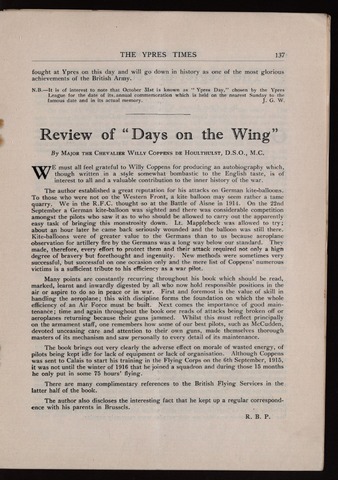THE YPRES TIMES
137
fought at Ypres on this day and will go down in history as one of the most glorious
achievements of the British Army.
N.B.It is of interest to note that October 31st is known as Ypres Day," chosen by the Ypres
League for the date of its annual commemoration which is held on the nearest Sunday to the
famous date and in its actual memory. J. G. W.
By Major the Chevalier Willy Coppens de Houlthulst, D.S.O., M.C.
WE must all feel grateful to Willy Coppens for producing an autobiography which,
though written in a style somewhat bombastic to the English taste, is of
interest to all and a valuable contribution to the inner history of the war.
The author established a great reputation for his attacks on German kite-balloons.
To those who were not on the Western Front, a kite balloon may seem rather a tame
quarry. We in the R.F.C. thought so at the Battle of Aisne in 1914. On the 22nd
September a German kite-balloon was sighted and there was considerable competition
amongst the pilots who saw it as to who should be allowed to carry out the apparently
easy task of bringing this monstrosity down. Lt. Mapplebeck was allowed to try;
about an hour later he came back seriously wounded and the balloon was still there.
Kite-balloons were of greater value to the Germans than to us because aeroplane
observation for artillery fire by the Germans was a long way below our standard. They
made, therefore, every effort to protect them and their attack required not only a hign
degree of bravery but forethought and ingenuity. New methods were sometimes very
successful, but successful on one occasion only and the mere list of Coppens' numerous
victims is a sufficient tribute to his efficiency as a war pilot.
Many points are constantly recurring throughout his book which should be read,
marked, learnt and inwardly digested by all who now hold responsible positions in the
air or aspire to do so in peace or in war. First and foremost is the value of skill in
handling the aeroplane; this with discipline forms the foundation on which the whole
efficiency of an Air Force must be built. Next comes the importance of good main
tenance time and again throughout the book one reads of attacks being broken off or
aeroplanes returning because their guns jammed. Whilst this must reflect principally
on the armament staff, one remembers how some of our best pilots, such as McCudden,
devoted unceasing care and attention to their own guns, made themselves thorough
masters of its mechanism and saw personally to every detail of its maintenance.
The book brings out very clearly the adverse effect on morale of wasted energy, of
pilots being kept idle for lack of equipment or lack of organisation. Although Coppens
was sent to Calais to start his training in the Flying Corps on the 6th September, 1915,
it was not until the winter of 1916 that he joined a squadron and during those 15 months
he only put in some 75 hours' flying.
There are many complimentary references to the British Flying Services in the
latter half of the book.
The author also discloses the interesting fact that he kept up a regular correspond-
once with his parents in Brussels.
R. B. P.

